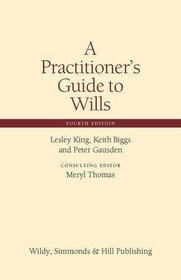Search -
A Practitioner's Guide to Wills (Wildy Practitioner Guide Series)
A Practitioner's Guide to Wills - Wildy Practitioner Guide Series
Author:
The fourth edition of this popular title provides a practical and comprehensive reference for all those concerned in drafting and interpreting wills, and in giving effect to their provisions. The commentary is supported throughout by an extensive range of specimen clauses and model wills are provided in a separate appendix. All precedent materia... more »
Author:
The fourth edition of this popular title provides a practical and comprehensive reference for all those concerned in drafting and interpreting wills, and in giving effect to their provisions. The commentary is supported throughout by an extensive range of specimen clauses and model wills are provided in a separate appendix. All precedent materia... more »
ISBN-13: 9780854902040
ISBN-10: 085490204X
Publication Date: 8/31/2016
Pages: 500
Edition: 4th Revised edition
Rating: ?
ISBN-10: 085490204X
Publication Date: 8/31/2016
Pages: 500
Edition: 4th Revised edition
Rating: ?
0 stars, based on 0 rating
Publisher: Wildy, Simmonds and Hill Publishing
Book Type: Hardcover
Members Wishing: 0
Reviews: Amazon | Write a Review
Book Type: Hardcover
Members Wishing: 0
Reviews: Amazon | Write a Review
Genres:
- Law >> Legal Self-Help >> Wills




